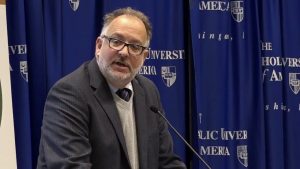
At this year’s Touchstone conference, I had the privilege of talking and learning from one of our guest speakers, Michael Hanby. Dr. Hanby is the Associate Professor of Religion and Philosophy of Science at the Pontifical John Paul II Institute for Studies on Marriage and Family at The Catholic University of America.
Last month I shared a section from Michael Hanby’s 2016 article, “A More Perfect Absolutism,” about certain taken-for-granted assumptions (and limitations) in how Americans think about politics. Hanby’s article is primarily about the mechanisms whereby technological absolutism control us. Again, Hanby’s reflections are more relevant now than when he originally wrote the piece:
“Technocratic absolutism relies less on the police power of the state and the coercive force of law than on an unaccountable bureaucracy and ubiquitous media that mediate what counts as the real world. This is arguably a more perfect form of absolutism than any seen heretofore, for its mechanisms of enforcement are internal as well as external. In a perfectly absolute society, whose rule was indeed total, no one would ever know he was being coerced. There would simply be truths that could no longer be perceived, ideas that could no longer be thought, experiences that could no longer be had, and no one would ever know what he was missing.”
Further Reading


